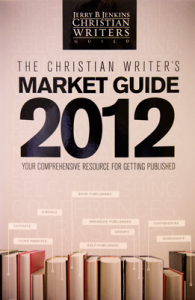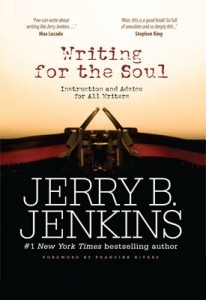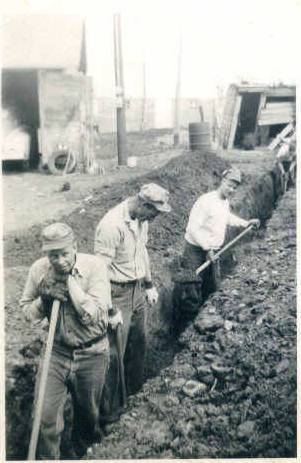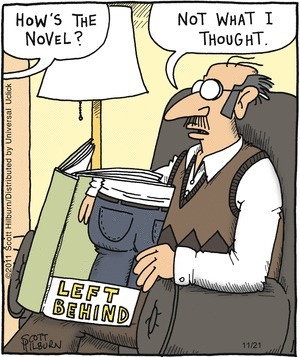Jerry B. Jenkins's Blog, page 35
January 2, 2012
My New Year's Gifts to You: 2 Freebies
As the author of more than 175 books, I've spent most of my life, writing, editing, and publishing in the inspirational market. My writing has appeared in Time, Reader's Digest, Writer's Digest, Parade, and dozens of other publications. I was featured on the cover of Newsweek magazine in May 2004, when the Left Behind series reached sixty-two million in sales.
Readers familiar only with my Left Behind novels may not realize that my career has also included stints as a sportswriter, photographer, sports editor, magazine editor, magazine publisher, book editor, book publisher, biographer, marriage and family author, and syndicated cartoon strip writer (Gil Thorp, 1996–2004).
Why am I telling you all this?
 Because Terry Whalin has persuaded me to allow him to grill me during a LIVE 70-minute telewebcast on Thursday, January 5th! We'll be talking about The Christian Writer's Market Guide (details below), but Terry wants your help, and that will make this personal and more beneficial to you.
Because Terry Whalin has persuaded me to allow him to grill me during a LIVE 70-minute telewebcast on Thursday, January 5th! We'll be talking about The Christian Writer's Market Guide (details below), but Terry wants your help, and that will make this personal and more beneficial to you.
* * * Here's Terry's Small Request * * *
Rather than have the content come solely from Terry's (or my) head for the January 5, 2012 telewebcast at 4 p.m. PDT / 8:00 p.m. EDT, he has decided to let you ask me a question.
Sound fair?
So, if you could ask me ANY question you wanted about writing or marketing for the Christian writer, what would it be?
Here's your chance to ask me directly and get registered for the free call on Thursday, January 5, 2012.
Just click the link below:
http://www.askjerryjenkins.com
 ***Get a FREE chapter on Pursuing Publication from my book Writing for the Soul***
***Get a FREE chapter on Pursuing Publication from my book Writing for the Soul***
You will receive a full chapter from Writing for The Soul.
It's FREE if you submit a question and register for this telewebcast.
Click the link below:
http://www.askjerryjenkins.com
The Christian Writer's Market Guide, now produced by my Christian Writers Guild, has for more than 25 years been the most comprehensive and highly recommended resource for Christian writers, agents, editors, publishers, publicists, and writing teachers. In addition to providing a wealth of ideas and tips for publishing in the Christian industry, The 2012 edition of The Christian Writer's Market Guide also includes up-to-date information on more than 400 book publishers, more than 600 periodicals, and hundreds of agents, contests, conferences, editorial services, niche markets, self-publishing services, and more. This is the ultimate reference tool for Christian writers.
But again, we want to talk about what you want to talk about. So after you submit your question, you'll find out how to get phone access and webcast access to Terry Whalin and me for the LIVE telewebcast, January 5, 2012.
I sure hope you can join us. Speak to you soon.
And happy 2012!
P.S. If the time of the telewebcast doesn't work for you, please go ahead and sign up anyway. The entire teleseminar will be recorded, and you will receive an email with the replay link. Also if you sign up, you will be able to immediately download the FREE Ebook chapter, "Pursuing Publication" from Writing for The Soul.
December 27, 2011
Timing is Everything
Wednesday's Writing on Writing
First thing in the morning is the best time for me to write, before anything else has begun to cloud my brain. What I write before noon is usually my best work, and the most I'll complete all day.
day.
I always start by editing the previous day's pages. Then my goal is to write half my allotted pages before lunchtime. If I start early and things go well, I can occasionally get all my pages done before noon. I resist the temptation to try to knock out another batch to make the next day easier. That's it for the day.
But if I start early and things have been difficult and it takes till midnight to finish my pages, I do it. I don't want to fall behind and be forced to write more the next day.
Whether you are a morning person or a night person, or both, it's best to write when you feel  fully rested and awake. But how many people ever wholly feel that way? If you tire while working, take a nap. But if you wait until you're completely cogent, coherent, and inspired, you may never get to the keyboard.
fully rested and awake. But how many people ever wholly feel that way? If you tire while working, take a nap. But if you wait until you're completely cogent, coherent, and inspired, you may never get to the keyboard.
You become a better writer by writing, by flexing those writing muscles.
When my writing cave was a hotel room, my time away from my wife Dianna was far less productive because it was so lonely.
Nowadays, when I'm in the cave, she's 100 feet away in the house, and we're together for meals, and when I'm done each day. She is my reward for finishing. Plus, I love talking about scenes with her before I commit them to the page.
Most novelists fear losing their creativity if they utter even a word of the story before getting it on paper.
But every time I tell my current story, I embellish it. Characterizations flesh out, the plot grows. I hone the details and get instant feedback about whether I'll be able to keep the attention of my reader.
Ideas for scenes and stories seem to hit me most often in the shower. Maybe the streams of water stimulate my brain. Or maybe it's because I can relax alone and think.
Words come slower to me at the keyboard some days, but I learned years ago to trust what some call the Muse. My muse is spiritual, a vital part of the creative subconscious I have surrendered to God. Foreshadowing and plot threads appear as I write. I may not be sure at the time why I include certain things, but later in the manuscript, the reasons become obvious.
Again, the key is writing when your mind is most alert. It's all about timing.
December 20, 2011
It’s a Wonderful Life
Wednesday’s Writing on Writing
I’ve always been a sucker for a tear-jerking story, but somehow I missed this Jimmy Stewart Christmas vehicle until I was flipping channels late one night while I was in my thirties and had a young …
Read more...
It's a Wonderful Life
 Wednesday's Writing on Writing
Wednesday's Writing on Writing
I've always been a sucker for a tear-jerking story, but somehow I missed this Jimmy Stewart Christmas vehicle until I was flipping channels late one night while I was in my thirties and had a young family.
I'd heard of it for years, many friends listing it among their favorite movies of all time. The title alone had always put me off. What kind of a sappy Frank Capra piece could it represent? I mean, Capra-esque had become a pejorative adjective.
But I was riveted from the first scene, and when the engine of the story revved up, I was in it till the end. The saga of a man longing to leave his little hometown, only to discover that everything he sought he already owned, will never grow old. Quaint and old-fashioned, this 64-year-old picture remains timeless.
The next day I was obnoxious, telling my family every detail of the man who had been given a chance to experience the world as if he had never been born.
I scoured the TV listings and insisted we all enjoy it together. The kids rolled their eyes, but they were soon as engrossed as I had been.
We haven't missed watching It's a Wonderful Life at Christmastime together in more than twenty-five years since, usually without a dry eye. The entire family knows every line, and soon even our kids' kids will begin watching.
Little surprise that Jenkins Entertainment's What If… [www.jenkins-entertainment.com] is a modern take on It's a Wonderful Life. Ours shows a man getting a glimpse of what his life would have been like had he made the right choices, rather than what the world would be like had he never been born.
There's something psychically satisfying about coming full circle and paying homage to my favorite Christmas story outside the Bible.
December 13, 2011
Crucial Reference Works
Wednesday's Writing on Writing
Almanacs and atlases are wonderful, inexpensive investments. A world almanac is a must for any serious writer, and if you can find one you like on disk, so much the better; you'll be relieved of the tiny print in the paperback versions, and you'll decrease look-up time.
any serious writer, and if you can find one you like on disk, so much the better; you'll be relieved of the tiny print in the paperback versions, and you'll decrease look-up time.
World almanacs list about anything you could ever want for basic research. I use them even for character names. When naming a foreign character, I'll look up his country of origin, scan the current government leaders for a last name, combine that with the first name from the country's history (say, a war hero), and bingo, I have a legitimate, ethnically accurate name.
 I use a world atlas, primarily because my characters travel the globe, and to be believable, I have to know time zones, current country names, monetary units, populations, average temperatures, and the like.
I use a world atlas, primarily because my characters travel the globe, and to be believable, I have to know time zones, current country names, monetary units, populations, average temperatures, and the like.
Atlases provide detailed maps, and Internet atlases even offer street maps — crucial to realistic action scenes. But almanacs also give the gross national product, offer tourism tidbits, and list major industries and resources. In the Left Behind series, I set some scenes in Greece, a country I hadn't visited (until last year). The almanac told me one of Greece's natural resources is lignite. A couple of more keystrokes in Google, and I discover that lignite is a type of coal used to generate electricity. I needed an occupation for a wealthy Greek. So he became a lignite magnate.
A couple of more keystrokes in Google, and I discover that lignite is a type of coal used to generate electricity. I needed an occupation for a wealthy Greek. So he became a lignite magnate.
Almanacs also show which countries are on the metric system, so when my character is racing through a metrics-using country in a rental car, he'll buy fuel in liters. Getting minuscule details right makes for a more entertaining read. And when you get them wrong, suddenly they're no longer minuscule.
You can find free almanacs, dictionaries, and encyclopedias online. Simply Google almanac or dictionary and investigate your options. Some sites require a subscription, but before you pay, make sure you'll actually use the product.
I use an electronic thesaurus, which is a good aid but also merits a caution: Never let it be obvious you've consulted a thesaurus.
Novice writers tend to seek the most exotic word, when the best use of a thesaurus is to remind yourself of alternative ordinary words. Avoid the obtuse and find the ordinary one that best conveys your meaning.
Believe me, readers can tell when you've fallen into a rut and overused a favorite word. They'll let you know.
December 6, 2011
Waiting for Inspiration?
Wednesday's Writing on Writing
Many writers — or would-be writers — talk about waiting for inspiration. If you're called to write, inspiration and passion should permeate your work.  But don't confuse inspiration with initiative.
But don't confuse inspiration with initiative.
Initiative cures procrastination and blasts you through writer's block. Passion gives you something inspiring to write about.
"The very best writing is born of humility," writes best-selling author Dean Koontz. "The truly great stuff comes to life in those agonizing yet exhilarating moments when the artist is acutely aware of the limitations of his skills. For it is then that he strains the hardest to make the most he can from the imperfect materials and tools with which he must work. The purpose of writing is communication, and if the work is not read, the purpose is not fulfilled."
Real writers want to see their words printed and be able to hold them in their hands. If that's you, good. Go for it!
Nurture that desire to be published. When someone tells me he doesn't care to be published or paid for his writing, but simply wants to express himself, I don't believe it.
He may be truly humble, but if his work is worth doing, his stuff worth writing, he should want to be published and read as widely as possible.
Don't apologize for wanting to be published. Sure, some ego is at play. Who doesn't want to be known, to be successful, to see his name in print? Just remember that publishing has to be a byproduct of your writing, not the goal. If you set out to glamorize yourself or write a best-seller, you might enjoy short-lived celebrity, but you won't have a career.
The most attractive quality in anyone is humility. Sometimes money and fame come. But if you become enamored with the trappings of success, they become your passion. Return to your first love.
Why are you a writer?
Are you an inspirational writer?
The answers have nothing to do with you. If serving God and others are not the reasons you write, you might as well write solely for the general market and only for money. That doesn't mean everything you write has to be a sermon or packed with Scripture, but your unique worldview should be evident.
November 29, 2011
Writing is Hard Work
Wednesday's Writing on Writing
Don't agree so quickly. Wait till you've been dragged down the bumpy road toward publication a few times. For now, admit that you suspect you're something special. The exceptional exception.
For you, writing will be a breeze. Editors will clamor for your work. You foresee a bidding war over your next book, with your bank account the big winner. Is that Reader's Digest on the phone?
Not so fast.
I was talking with an editor friend, a veteran of many writers conferences, who has seen all levels of competency. "It's rare that you find a first-timer who really gets it," she said. Writing is not a hobby, a spare-time activity, or something to play at. It's work. 
For me, writing is as exhausting as physical labor. After writing and publishing more than 175 books, that still surprises me.
Sometimes, on deadline, I'll sit at the keyboard for six, eight, ten hours or more. When I'm finished, I'm as spent as if I've been ditch-digging all day. I don't understand it. It doesn't seem physically taxing, but it is. I guess it's a fact that you must be constantly thinking in order to write.
Creativity will cost you, wear you out.
Don't ever get the idea writing is easy. If it is, you're not working hard enough. The stuff that comes easy takes the most rewriting. And stuff that comes hard reads the easiest.
A psychologist friend once asked if I would have lunch with him and give him a few tips. "I'm thinking about doing a little freelance writing in my spare time," he said.
"Interesting," I said. "I've been thinking about doing a little psychological counseling in my spare time."
"I didn't know you were trained for that."
"Gotcha," I said.
When you hang out your shingle as a writer, be prepared for unintended slights like that.
People tell me all the time that they have a book in them, if they only had time to write.
That would be like my saying I have a sermon in me, if only I had time to prepare it. Pulpit work is something a person is trained and set apart for.
If people want to tell themselves they could be the one-in-a-thousand writer who could sell a manuscript to a book publisher, if they could only find the time, fine. They'll learn the truth when they sit before the blank computer screen.
So don't be one of those who just talks about it or plays at it. Work at it.
November 28, 2011
November 22, 2011
Making Your Readers Care
Wednesday's Writing on Writing
You've been taught to begin your fiction at a high point of action, but don't forget to plant insights into the characters' personalities. If we writers do our jobs, readers get caught in the middle of the action — but only if they care about the characters.
Will the car break through the guard rail?
 Will the baby and its mother die?
Will the baby and its mother die?
Who cares unless they know at least a little something about them?
Otherwise readers can tell themselves it's just fiction and turn to something else. Knowing where to slip in a few hints about the endangered person sets the pro writer apart from the amateur. The more you can make readers care about the young mother and her baby, the heavier the anxiety over their impending doom.
Does the mother slowly back out of the garage, checking her mirrors twice, recalling a childhood driveway tragedy? Is she thinking about the baby's first birthday party, hoping her husband remembered?
Has he been distant since the baby was born, still tentative because they lost their first in childbirth?
All these elements foreshadow danger, but they also tell us about our protagonist.
She's thoughtful, careful, loving, hopeful, worried.
What's riding on this birthday party?
Now that her daughter is a year old, perhaps her husband will return to his old self and she won't have to worry that someone at the office has caught his eye.
Now, when she misses a sign, takes a mountain curve too fast, and the car scrapes a guardrail, we care more than if we'd started in the middle of that harrowing scene, knowing nothing of her background.
Character is the foundation for fiction. Put interesting characters in difficult situations and you'll find your plot emerging. The operative words are interesting and difficult. If you wonder why a scene lies flat, examine it for interesting characters and a difficult situation.
Those provide the conflict that becomes your story's engine.
Your hero must be a real, normal person who rises to the occasion. My characters say things I wish I would, things that in real life I don't think of until it's too late. My characters learn to be direct and brave after having been tongue-tied and afraid. They change and grow. That's the definition of character arc.
Authors, too, must change and grow. If we are not different by the end of the writing, something is wrong. And each effort should be an improvement over the last.




